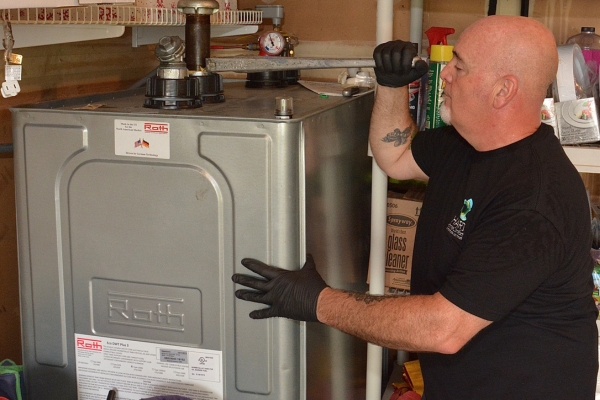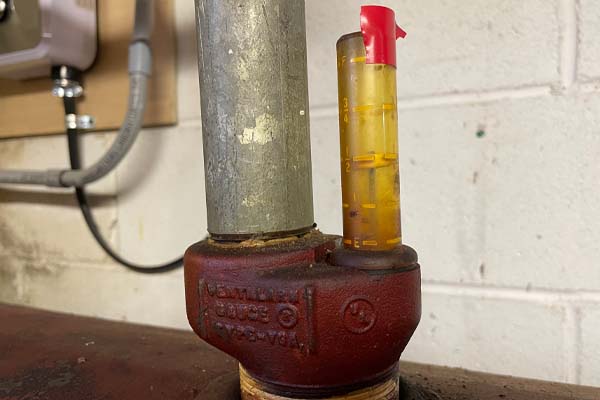How Sludge Forms In Your Heating Oil Tank And What You Can Do About It

Heating oil is a crucial element for many homes, stored in fuel tanks to provide warmth and hot water throughout the seasons. The longevity of the oil supply varies based on tank size and your household’s usage, playing a pivotal role in maintaining comfort during the colder months. Keeping your oil tank in optimal condition is essential to avoid issues such as heating oil tank sludge accumulation.
Heating oil tank sludge, a viscous substance, can develop over time, leading to significant inconveniences for homeowners. While it’s impossible to prevent sludge formation in heating oil tanks entirely, certain measures can delay its onset. By taking these steps, you can enhance the lifespan of your oil tank.
This article by Hart Home Comfort, a local oil supplier, discusses the causes and prevention strategies for heating oil tank sludge, emphasizing how to manage and mitigate its buildup.
Understanding Heating Oil Tank Sludge Formation
Table of Contents
- 1 Understanding Heating Oil Tank Sludge Formation
- 2 Challenges Posed by Oil Tank Sludge
- 3 Strategies for Preventing Heating Oil Tank Sludge
- 4 FAQ: Understanding Heating Oil Tank Sludge
- 4.1 What Indicators Suggest Sludge Is Accumulating in My Heating Oil Tank?
- 4.2 Does Sludge in My Heating Oil Tank Impact the Longevity of My Heating System?
- 4.3 How Frequently Should I Check My Heating Oil Tank for Sludge?
- 4.4 What Steps Should I Take If I Find Sludge in My Tank During an Inspection?
- 4.5 Do Certain Types of Heating Oil Help Minimize Sludge Formation?
- 5 Conclusion
- 6 Reach Out to Hart Home Comfort for Reliable Heating Oil Delivery
Sludge formation in heating oil tanks is a gradual process influenced by several specific conditions. By recognizing the contributing factors, you can take steps to prevent them. The following sections will examine the essential components, key causes, related issues, and strategies for avoiding sludge accumulation.
Exploring Heating Oil Tank Sludge

Heating oil tanks hold more than fuel; they also accumulate dirt, debris, rust, and moisture. These elements, along with microorganisms flourishing in the tank’s damp and dark conditions, settle at the bottom and amalgamate into a dense sludge.
The likelihood of sludge formation increases in nearly empty tanks, where residual fuel sits for prolonged periods. This is often the case post-winter, as homeowners may only check their tanks once the need arises with falling temperatures. Fuel delivery personnel might first discover the sludge during routine refills.
Secure Warmth. Trust Hart Home Comfort for timely and reliable heating oil delivery. Schedule your delivery today by calling us now!
What Leads to the Formation of Fuel Oil Tank Sludge?
Fuel oil tanks are designed with a vent pipe to manage airflow. When oil is delivered, air is pushed out, producing a whistling sound, and as the oil is used, air re-enters to replace it, maintaining internal pressure balance. However, introducing cold, moist air can lead to condensation on the tank’s inner walls, eventually causing rust. This rust deteriorates into flakes that settle at the tank’s bottom. The residual fuel interacts with elements like light, heat, air, and water inside the tank. This creates an environment conducive to bacteria, which feed on these materials and gradually form sludge.
Challenges Posed by Oil Tank Sludge
Here, we outline the complications arising from oil tank sludge.
Diminished Energy Efficiency

Effort is required to prevent oil tank sludge. Preventing oil tank sludge is vital for maintaining your heating system’s optimal performance. Ignoring this issue can lead to worsening conditions. Sludge, characterized by its thick and sticky consistency, can obstruct the fuel supply line and clog the oil filter. This blockage may prevent adequate fuel from reaching the heating system. Even if some oil does make it through, a clogged filter will diminish the system’s energy efficiency. This leads to higher heating costs for your home.
Stay Cozy. Rely on Hart Home Comfort for efficient heating oil delivery. Contact us today to arrange your next fuel delivery!
Heating System Failures
Do not overlook the formation of sludge in your heating oil tank. While it might not seem urgent, sludge accumulation gradually strains your HVAC system, potentially leading to a complete shutdown. Sludge can infiltrate sensitive components, causing significant damage. If the furnace or boiler stops responding, you could face substantial repair costs to restore functionality.
Additionally, tanks compromised by leaks and sediment buildup might need replacement. If your tank is corroded with rust, considering a new tank is wise, as weakened structural integrity will inevitably lead to issues.
Strategies for Preventing Heating Oil Tank Sludge
Prevention is crucial when dealing with potential sludge buildup in your heating oil tank, helping you sidestep the associated difficulties. Employ these methods to ensure your tank remains clean and free of clogs.
Maintain Regular Heating Oil Deliveries

The likelihood of sludge formation increases when fuel levels are low, as more air—and its inherent moisture—fills the empty space, leading to condensation on the tank’s interior surfaces. To prevent this, arrange for oil deliveries before your tank nears emptiness.
Waiting too long heightens the risk of fuel line blockages, which could abruptly cut off your supply. This can leave your home without heat and complicate maintenance. Ensure timely contact with your local supplier to guarantee consistent and prompt fuel delivery.
Incorporating Heating Oil Additives

Utilizing a chemical additive is an effective method to prevent sludge buildup in your heating oil tank. Add it to the tank just before your next fuel delivery. These additives are designed to break down existing sludge, facilitating easier cleanup. Verify that it includes a dispersant compound when choosing an additive by checking the label.
Numerous products are available online, and other beneficial features to look for include algae prevention, water removal capabilities, and a wax inhibitor. This treatment helps to reduce particle size, allowing them to flow freely through the fuel lines and filters. Implementing this once each heating season can help maintain a sludge-free system.
Additionally, some heating oil providers already include additives in their fuel to combat sludge formation. It’s wise to confirm with your provider whether their oil comes pre-treated.
Keep Comfortable. Choose Hart Home Comfort for dependable heating oil services. Contact our team to book your delivery appointment today!
Caring for Your Heating Oil Tank
Show your heating oil tank some attention by regularly replacing the oil filter and scheduling professional inspections. Qualified technicians will check for clogs and sludge deposits and address these issues promptly to prevent further complications.
Opt for High-Quality Home Heating Oil
It’s a common misconception that all heating oil is identical, regardless of the source. However, premium-quality oils contain fewer contaminants that can contribute to sludge formation. Choosing these superior oils leads to better system performance and fewer maintenance issues.
Seek out a reputable supplier in your area—asking neighbors for recommendations can lead you to a reliable company known for delivering clean fuel and offering support for sludge-related issues. Such a provider can ensure your heating system runs smoothly and provide guidance on preventive maintenance you can perform at home.
Maintain a Full Heating Oil Tank

Many homeowners typically refill their heating oil tanks only during the colder months, allowing the tank to remain nearly empty through spring and summer. This results in most of the tank’s volume being filled with humid air, creating ideal conditions for rust and sludge to develop.
To prevent this, consider keeping your tank full even during the off-season. A full tank minimizes the presence of air and water vapor, reducing the risk of rust formation and bacterial growth.
Fuel Your Warmth. Depend on Hart Home Comfort for prompt heating oil delivery. Secure your next delivery by calling us today!
FAQ: Understanding Heating Oil Tank Sludge

Here are some common questions and answers to help you better understand heating oil tank sludge.
What Indicators Suggest Sludge Is Accumulating in My Heating Oil Tank?
Signs that you may be dealing with sludge accumulation include erratic furnace behavior, repeated filter blockages, and a drop in energy efficiency. These symptoms indicate that a tank inspection for sludge might be necessary.
Does Sludge in My Heating Oil Tank Impact the Longevity of My Heating System?
Yes, sludge in your heating oil tank can greatly diminish the operational lifespan of your heating system. It obstructs fuel lines and filters, placing undue strain on your furnace or boiler, which can cause early system failures.
How Frequently Should I Check My Heating Oil Tank for Sludge?
You should inspect your heating oil tank for sludge annually, ideally before the onset of the heating season. This proactive approach helps resolve any potential issues before they affect the performance of your system in the colder months.
Maintain Your Heat. Opt for Hart Home Comfort for a consistent heating oil supply. Schedule your delivery today by getting in touch with us!
What Steps Should I Take If I Find Sludge in My Tank During an Inspection?
If you find sludge in your tank during an inspection, it is crucial to have it professionally removed. Operating your heating system with a tank full of sludge can cause inefficiencies and increase the risk of system failures.
Do Certain Types of Heating Oil Help Minimize Sludge Formation?
Opting for high-quality, low-sulfur heating oil can significantly lessen the likelihood of sludge formation. Additionally, some suppliers provide heating oils specially treated with additives designed to reduce sludge accumulation and prevent corrosion within the tank.
Conclusion
While heating oil tanks may appear static, their interiors are anything but. Air and fuel continually cycle through, and water vapor condenses on the inner walls, leading to corrosion and promoting bacterial growth. To prevent sludge formation, keeping the tank clean and well-filled is crucial. Opt for high-quality oil from trusted suppliers and seek professional assistance for more complex maintenance needs.
Reach Out to Hart Home Comfort for Reliable Heating Oil Delivery
Hart Home Comfort is a leading provider of heating oil and HVAC services in Nassau County, Suffolk County, and Queens, New York, catering to the specific needs of local residents. We offer a diverse range of heating oil delivery options and flexible payment plans, enabling you to tailor your deliveries to suit your individual requirements. Choose Hart Home Comfort for competitive pricing and dependable, swift fuel delivery services that ensure your home remains cozy throughout the colder months.
Beyond heating oil delivery, Hart Home Comfort also offers professional HVAC services. Our certified technicians are well-equipped to manage all aspects of your heating system, from routine maintenance to emergency repairs. Our HVAC services are crafted to enhance both the efficiency and comfort of your home, thereby aiding in long-term energy cost reductions.
Contact Hart Home Comfort today to schedule your heating oil delivery or to book an HVAC service appointment. Rely on us for exceptional service and comprehensive support for all your heating and cooling needs.
Contact us now to discover more about our products and services. We offer free, in-home estimates. Click here to check out our service areas.
For any questions about what Hart Home Comfort can do for you, give us a call today. Click here to contact us now or call us at (631) 667-3200 to find out more! Click the link to view our service area.

Related Articles: